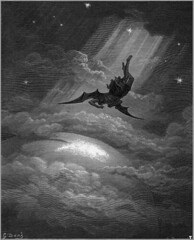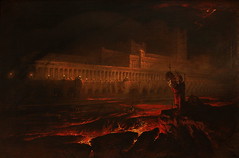I strangely missed English cult poet John Milton‘s 400th birthday, luckily John Coulthart reminded me of it. [1]
John Milton (1608 – 1674) is best known for his epic poem Paradise Lost, and for his treatise condemning censorship, Areopagitica.
On the significance of Paradise Lost, it’s safe to say that it is one of the cult fiction items of 17th century literature, along with Don Quixote (1605), Simplicissimus (1668), Letters of a Portuguese Nun (1669) and La Princesse de Clèves (1678).
Paradise Lost introduces the antihero in Western literature, by not portraying him as stupid and indulgent, but – as in Paradise Lost’s case – downright evil; a precursor to 20th century psychopaths (see Fictional portrayals of psychopaths in literature).
As I said, the protagonist (so pronounced by the Romantics) of this epic is an antihero, in this case the fallen angel, Satan which Milton presents as an ambitious and proud Satan being who defies God, and wages war on Heaven, only to be defeated and cast down. Indeed, William Blake, a great admirer of Milton and illustrator of the epic poem, said of Milton that “he was a true Poet, and of the Devil’s party without knowing it.”
On the psychoanalytical side, Sholem Stein has remarked: “Milton worked for Oliver Cromwell and the Parliament of England and thus wrote first-hand for the Commonwealth of England. Arguably, the failed rebellion and reinstallation of the monarchy left him to explore his losses within Paradise Lost” and adds that “Milton sympathized with the Satan in this work, in that both he and Satan had experienced a failed cause.”
Modern editions have all 50 of Doré’s illustrations for Paradise Lost, recounting mankind’s fall from the grace of God through the work of Satan. Among the events depicted are the expulsion of Satan from Heaven, Adam and Eve in Paradise and the nine-day fall of Lucifer’s legions to Hell.


